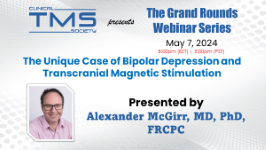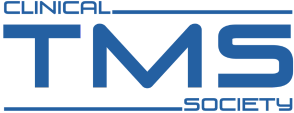
- This event has passed.
The Unique Case of Bipolar Depression and Transcranial Magnetic Stimulation
May 7, 2024 @ 5:00 pm - 6:00 pm
$50
> > Register Now <<
There are few level 1 evidence based treatments for bipolar depression, and when these are either ineffective or poorly tolerated alternative non-pharmacological treatments are required. Non-invasive neurostimulation, in particular transcranial magnetic stimulation, is a treatment option for difficult to treat depression that is of interest in bipolar depression. In 2020, the FDA granted breakthrough designation for TMS for bipolar depression, however if it does receive approval it remains to be determined where TMS belongs in the bipolar depression algorithm. Here, we will review the management of bipolar depression, and review the peer reviewed literature using TMS to treat bipolar depression. In particular, the conflicting data will be contextualized within the unique biological and pharmacological constraints that characterize bipolar disorder.
At the end of this presentation participants will:
- Understand the current management of bipolar depression.
- Review the clinical trial and open label literature using TMS to treat bipolar depression.
- Appreciate the complex interplay between biology and pharmacology that makes TMS in bipolar disorder unique.
1 CME Credit Available
Format: Webinar
Cost: Members: $25 | Non-members $50 | Student Members FREE
Speaker: Alexander McGirr, MD, PhD, FRCPC
 Alexander McGirr received his MSc in neuroscience at McGill University under Dr. Gustavo Turecki before pursuing medical school at the University of Toronto. There, in addition to medical studies he pursued basic science training under Dr. John Roder. His research track psychiatry residency at the University of British Columbia, where his clinical research in mood disorders was under Drs. Lam and Yatham, included a contemporaneous PhD in Neuroscience under Dr. Timothy Murphy. His independent research includes two fronts: 1) a human research program that is both pre-clinical and clinical using non-invasive brain stimulation to probe and treat neuropsychiatric illness, and 2) a basic science program using animal models and next gen technologies for circuit dissection and to understand how risk factors related to neuropsychiatric illness change neural circuitry in an effort to inform treatments in humans.
Alexander McGirr received his MSc in neuroscience at McGill University under Dr. Gustavo Turecki before pursuing medical school at the University of Toronto. There, in addition to medical studies he pursued basic science training under Dr. John Roder. His research track psychiatry residency at the University of British Columbia, where his clinical research in mood disorders was under Drs. Lam and Yatham, included a contemporaneous PhD in Neuroscience under Dr. Timothy Murphy. His independent research includes two fronts: 1) a human research program that is both pre-clinical and clinical using non-invasive brain stimulation to probe and treat neuropsychiatric illness, and 2) a basic science program using animal models and next gen technologies for circuit dissection and to understand how risk factors related to neuropsychiatric illness change neural circuitry in an effort to inform treatments in humans.
